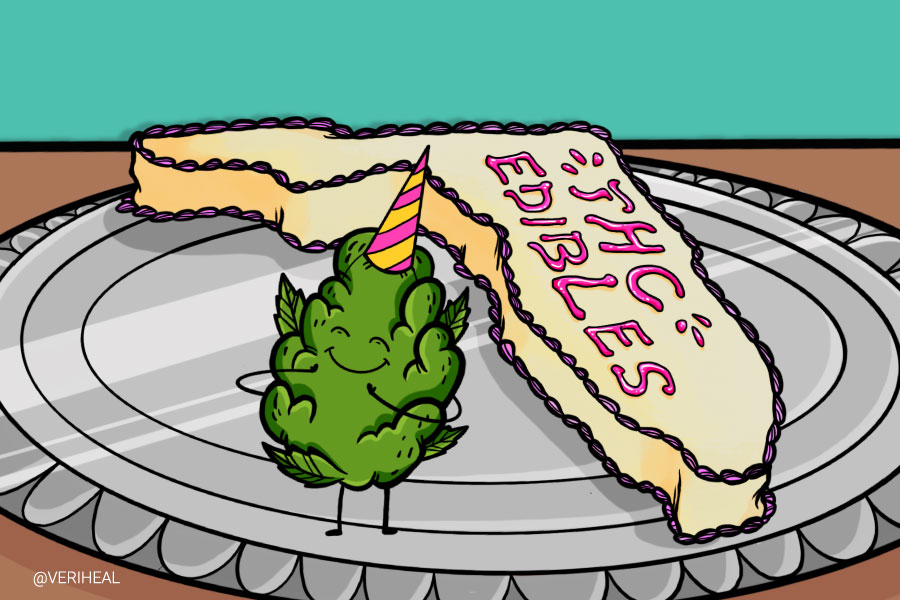Florida’s journey to cannabis legalization has not been easy or straightforward, much like many other states. As of today, possession or sale of cannabis remains illegal in the state of Florida. In fact, the sale of cannabis in certain places or in certain quantities qualifies as a felony and is punishable by fines of up to $10,000 or a prison sentence of up to 15 years. The exception to this law is medical cannabis, which has been legal in Florida since 2014. Florida’s Compassionate Medical Cannabis Act empowered many residents to seek the aid of medical cannabis for various conditions after having obtained a medical cannabis card. But medical cannabis laws in Florida are far from straightforward. Recently, cannabis edibles have been made available to Florida residents who qualify for medical use. But this was not always the case.
Florida’s History with Medical Cannabis
Florida’s Compassionate Medical Cannabis Act allowed for the use of medical cannabis, but with several restrictions. The cannabis that was approved for medical use was required to have a low THC content, and patients had to register their use of the substance on the Compassionate Use Registry, arguably a violation of their privacy. Only patients suffering from specific conditions, namely cancer, epilepsy, muscle spasms, and chronic seizures, were given permission to use cannabis as treatment.
In 2016, the Florida State Legislature passed a law that expanded the list of qualifying conditions to include such issues as chronic pain, PTSD, HIV, ALS, Parkinson’s Disease, and several others. The 2016 law also established more Medical Marijuana Treatment Centers, making it easier for patients to access cannabis. In 2019, regulations were passed that required the accurate labeling of all CBD products. This is unquestionably a good thing because it empowers Florida lawmakers to regulate the CBD market with increased accuracy and gives patients more confidence about the products they’re buying. Improved, more accurate information around cannabis is always a positive step when it comes to legalization, as it is largely fear and misinformation that has led to cannabis being labeled a Schedule I substance in the first place.
Why You Should Get Your Medical Marijuana Card
Veriheal has satisfied millions of patients nationwide by giving them access to these benefits
- Larger purchase limits
- Peace of mind
- Enhanced legal protection
- Access to higher potency strains
- Save up to 25% on cannabis purchases
- Skip the line at the dispensary
Florida’s early laws surrounding cannabis have also been notoriously strict regarding the way medical cannabis can be taken in. While oils, tinctures, and other similar products were made available early on, smokable cannabis was not available for medical use in Florida until last year.
Cannabis Edibles are Now Available
Now, Florida residents qualifying for medical cannabis use have access to a new form in which to partake of the herb—edibles. This is a result of the Florida Department of Health publishing new emergency rules governing medical cannabis. These rules allow the state’s medical cannabis industry to produce and sell THC-infused edibles like baked goods and candies.
However, Florida isn’t finished with the idea of imposing restrictions on the medical cannabis industry. Though the new legislation clears the way for edibles to be sold and consumed, compliance with the law requires that the edibles must take the form of lozenges, baked goods, chocolates, gelatins, or drink powders, They may not be offered in bright colors, as those colors might be tempting to young children. They must be mindfully packaged so as not to resemble any candies that are currently available on the commercial market.
Many Florida dispensaries have already taken advantage of this change in the law and are beginning to offer medical cannabis edibles to their customers, and we expect that this change will continue to spread throughout Florida. Edibles are often the most appealing way to consume cannabis for people, and we hope Florida residents will find the medical aid they need through this new legislation.
Author, Share & Comments
















